Envoy's visit excites hope of DPRK talks
Updated: 2013-04-23 11:27
By Chen Weihua in Washington (China Daily)
|
||||||||
After weeks of harsh rhetoric over the Democratic People's Republic of Korea, quiet diplomacy is taking shape with regard to the country and its nuclear and ballistic-missile ambitions.
Wu Dawei, China's special envoy for the DPRK, is in Washington this week at the invitation of his US counterpart, Glyn Davis, the State Department's special representative to the DPRK.
Wu, chairman of the suspended Six-Party Talks to denuclearize the Korean Peninsula, will be part of an in-depth exchange of views on "maintenance of peace and stability and denuclearization" of the region, Chinese Foreign Ministry spokeswoman Hua Chunying said on Friday.
The Yonhap News Agency of the ROK reported that Wu met with Glyn Davies, and Dan Friend, who leads the sanctions office at the State Department on Monday.
"Discussions have just begun," Wu told reporters in Chinese, leaving the department building. He gave no other comments.
On Tuesday, Wu is scheduled to hold meetings with Wendy Sherman, undersecretary of state for political affairs, and Joseph Yun, acting assistant secretary of state for East Asian and Pacific affairs. He arrived here on Sunday for a four-day stay, his first official trip to the US since 2010.
At a regular press briefing on Monday, however, State Department spokesman Patrick Ventrell wouldn't reveal details of Wu's meetings in Washington.
"What I will say is that we, the United States and China, both agree on the fundamental importance of a denuclearized North Korea. So that's the broad agreement on our policy," he said.
At the White House, presidential press secretary Jay Carney also didn't mention any meetings or say if tensions on the Korean Peninsula have subsided.
"We're not in any way prepared to say that this episode or period is over," he told reporters. "The fact is, North Korea remains out of compliance. It continues to say and do things that serve no other purpose than to heighten tensions and to further isolate the North Korean people and the North Korean regime."
Wu's visit is seen as a positive sign that a return to the negotiating table is possible for the first time since the Six-Party Talks were halted in 2009. The talks involved the DPRK, the Republic of Korea, China, the US, Japan and Russia.
On April 11 and 16, US President Barack Obama said the US was open to dialogue regarding Pyongyang. During his visit to China last week, Secretary of State John Kerry also expressed interest in talking with the DPRK, on the precondition that it agreed to give up its nuclear weapons.
The DPRK, which rejected that proviso, said it won't return to talks unless economic sanctions imposed by the United Nations Security Council are ended and that the US ends its joint military exercises with the ROK.
Wu's visit "is clearly intended to mediate between North Korea and the US. There has been a lot of tough talk on both sides, but dialogue is the only realistic way forward," said Charles Armstrong, director of Columbia University's Center for Korean Research.
He believes there's a strong likelihood the Six-Party Talks will resume, possibly as soon as this summer.
"Although the talks were suspended in 2009, they are not officially dead and could be revived," Armstrong said. "Other forums are also possible, such as four-way talks between North and South Korea, China and the US relating to issues of peace and security, specifically about the Korean War armistice."
Armstrong said the end of US-ROK military drills later this month could help foster an atmosphere conducive to dialogue. Even so, it's unlikely that talks could resume immediately after such a heated period of confrontation.
"We are likely to see indirect discussions, mediated through China, as well as possibly low-level discussions between American and North Korean officials in third countries, before formal talks resume," he said.
Scott Snyder, a senior fellow in Korean studies at the Council on Foreign Relations, said it's good that Wu will be able to take in the attitudes in Washington toward the DPRK.
"The six-party talks can be a way of addressing the North Korea nuclear issue, but only if North Korea returns to the pledges it made in the joint statement of 2005 regarding its willingness to abandon its nuclear program. Unfortunately, I am currently not optimistic," he said.
"We have a very difficult issue on our hands that has only gotten worse. Many people in Washington have expectations that cooperation with China is necessary to manage and solve the current problems, but I think in Beijing there are expectations that the US must take a proactive stance to manage and solve the current problems.
"Probably both sides will have to work more closely together in order to solve these problems," Snyder said.
Wu's visit is part of a series of diplomatic exchanges this week. General Martin Dempsey, chairman of the US Joint Chiefs of Staff, and Deputy Secretary of State William Burns are visiting China.
On Wednesday, South Korean foreign minister Yun Byung-se will meet in Beijing with his Chinese counterpart, Wang Yi, and other officials to discuss bilateral and regional issues, spokeswoman Hua said on Monday.
"The six-party talks can be a way of addressing the North Korea nuclear issue, but only if North Korea returns to the pledges it made in the joint statement of 2005 regarding its willingness to abandon its nuclear program. Unfortunately, I am currently not optimistic," he said.
"We have a very difficult issue on our hands that has only gotten worse. Many people in Washington have expectations that cooperation with China is necessary to manage and solve the current problems, but I think in Beijing there are expectations that the US must take a proactive stance to manage and solve the current problems.
"Probably both sides will have to work more closely together in order to solve these problems," Snyder said.
Wu's visit is part of a series of diplomatic exchanges this week. General Martin Dempsey, chairman of the US Joint Chiefs of Staff, and Deputy Secretary of State William Burns are visiting China.
On Wednesday, South Korean foreign minister Yun Byung-se will meet in Beijing with his Chinese counterpart, Wang Yi, and other officials to discuss bilateral and regional issues, spokeswoman Hua said on Monday.

 Copyright watchdog urges industry dialogue
Copyright watchdog urges industry dialogue
 Prices at scenic spots to go down
Prices at scenic spots to go down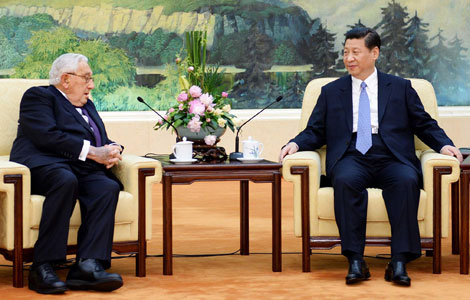
 Xi meets former US heavyweights
Xi meets former US heavyweights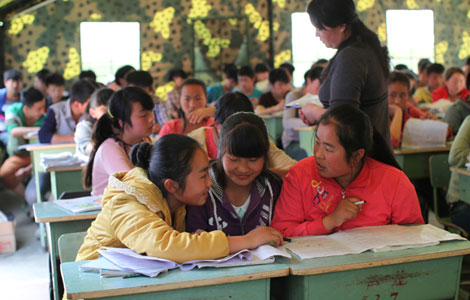
 Classes resume in quake-hit zone
Classes resume in quake-hit zone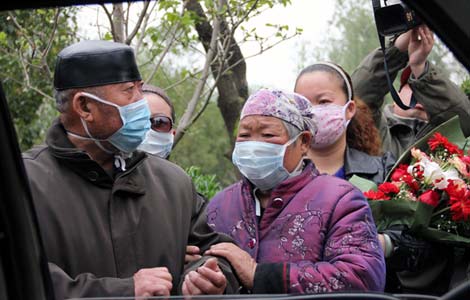
 First H7N9 flu case in Taiwan
First H7N9 flu case in Taiwan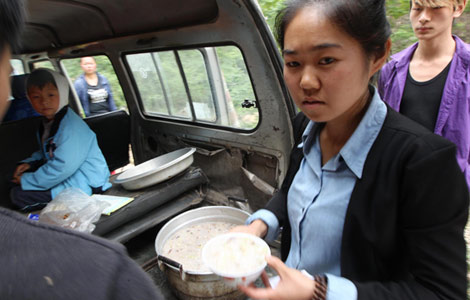
 Family feeds quake workers
Family feeds quake workers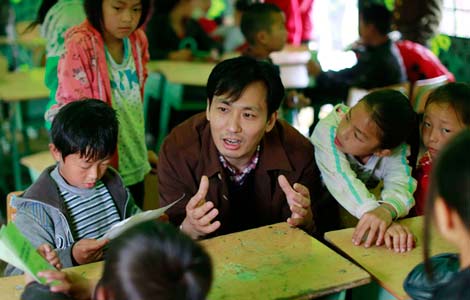
 Children gathered together as healing process begins
Children gathered together as healing process begins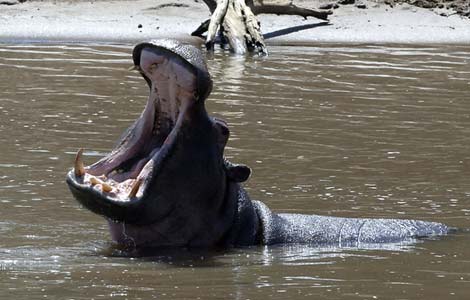
 Fears surface after hippo kills tourist from Shanghai
Fears surface after hippo kills tourist from Shanghai
Most Viewed
Editor's Picks

|

|

|

|

|

|
Today's Top News
No let up in home price rises
Bird-watchers undaunted by H7N9 virus
Onset of flood season adds to quake zone risks
Vice-president Li meets US diplomat
China has a tourism law
Meeting delivers big deals
China denies border spat with India
Chinese consumers push US exports higher
US Weekly

|

|






